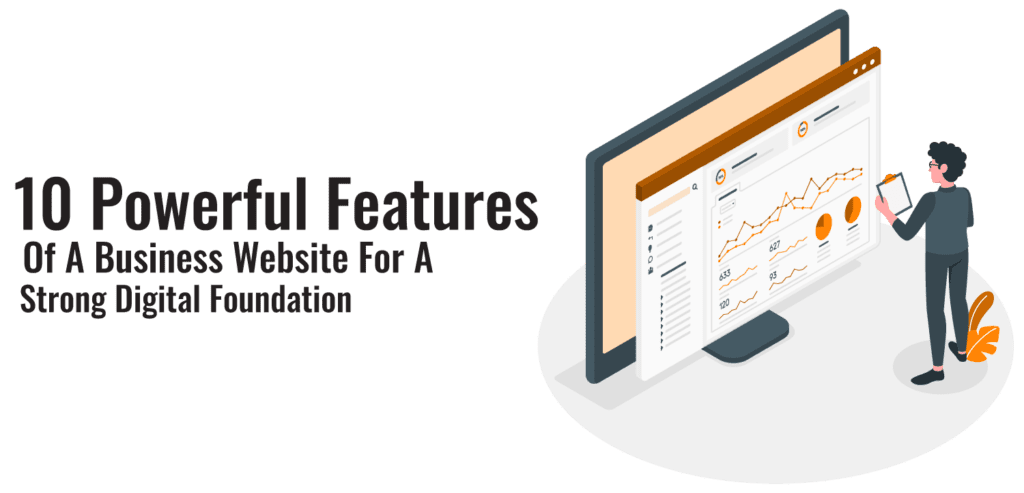A good online presence is significant for a business to succeed. A well-designed website is the starting point for your online presence. It helps you reach more people and makes your business more trustworthy.
Additionally, To make your website load faster than others, you need to add features that make it more visible and trustworthy. Excitingly, at VirtueNetz, we are providing Digital Marketing services for a robust digital foundation. Hence, this article will talk about the ten best features of a business website that every business website should have to create a solid online presence.
Important Features of Business Website for Strong Digital Foundation

A solid digital base is vital for a website to succeed. It pulls in and captivates visitors while assisting you in reaching your business objectives. Luckily, having a well-organized website that provides:
✔ An exceptional user experience
✔ Establish a strong brand identity
✔ Drive traffic & generate leads
✔ Convert visitors into loyal customers
Therefore, by adding impressive features to your website, you can establish trust and outperform others in today’s challenging market. Hence, to help you with that, VirtueNetz now discusses the top 10 compelling features of a business website:
User-friendly Navigation & Intuitive Layout
1: Clear & Intuitive Menu Structure
A well-organized menu structure helps users easily navigate your website. Additionally, It should have clear and concise labels, enabling visitors to find the information they need without confusion.
2: Consistent Navigation Elements Across All Pages
Maintaining consistent navigation elements is crucial for your website. Its features include your website’s menu, search bar, and contact information. Hence, It ensures a seamless user experience and helps users quickly find what they want.
3: Responsive Design for Mobile Devices
With the increasing use of smartphones and tablets, it’s essential to have a responsive website design that adapts to different screen sizes. Additionally, It ensures a consistent and user-friendly experience across all devices.
High-quality and Engaging Visual Content
1: Professional and Visually Appealing Layout
An attractive layout is the best feature of a business website. A visually appealing form creates a positive first impression and engages visitors. Hence, Use a clean, modern design consistent with your brand identity to effectively showcase your products or services.
2: High-quality Images and Graphics
Using high-quality images and graphics enhances the visual appeal of your website. In Addition, Invest in professional photography or use reputable stock image sources to ensure your visuals are clear, crisp, and relevant to your content.
3: Consistent Branding Elements
Consistency in branding elements, such as colour schemes, fonts, and logos, establishes a strong brand identity. Therefore, incorporate these elements throughout your website to reinforce brand recognition and trust.
Engaging Homepage
1: Clear and Concise Value Proposition
Your homepage should communicate the unique value your business offers. Fortunately, Use concise and compelling language to grab visitors’ attention and motivate them to explore further.
2: Compelling Call-to-Action (CTA) Buttons
Strategically placed and well-designed CTA buttons guide visitors toward desired actions, such as:
1. Purchasing
2. Subscribing to a newsletter
3. Requesting more information.
Moreover, it would help if you used persuasive language to encourage conversions.
3: Highlighting Essential products/services
Feature your essential products or services prominently on your homepage to capture visitors’ interest immediately. Therefore, use visually appealing images, concise descriptions, and compelling benefits to encourage further exploration.
Speed and Performance Optimization
1: Importance of Fast-Loading Pages
Website speed significantly impacts user experience and search engine rankings. Hence, optimize your website’s loading speed by minimizing unnecessary scripts, optimizing code, and leveraging caching techniques.
2: Optimizing Image and File Sizes
Large images and files can slow down your website. That’s why compress & optimize images, use appropriate file formats, and minify CSS and JavaScript files. So, It can reduce load times without compromising quality.
3: Minimizing Server Response Time
Ensure your website is hosted on a reliable and fast server. Hence, minimize server response time by choosing the best hosting provider and regularly monitoring server performance. Therefore, Minimizing server response time is crucial in features Of Business Website.
Search Engine Optimization (SEO) Features
1: Keyword Research and Integration
Conduct thorough keyword research to identify the terms your target audience uses to search for products or services like yours. Moreover, integrate these keywords into your website’s content, headings, and meta tags.
2: Meta Tags and Descriptions
Optimize your meta tags and descriptions to provide concise and relevant information about each webpage. Fortunately, include relevant keywords and compelling reports to improve search engine visibility and click-through rates.
3: URL Structure and Sitemap
Create search engine-friendly URLs that are descriptive and easy to read. Additionally, generate a sitemap to help search engines understand the structure and hierarchy of your website, improving its index ability.
Contact and Lead Generation
1: Easy-to-Find Contact Information
Ensure your contact information, including phone number, email address, and physical address, is prominently displayed on your website. Notably, make it easy for visitors to contact you with questions or inquiries.
2: Contact Forms for Inquiries
Implement user-friendly contact forms that allow visitors to send inquiries or requests quickly. Keep the form fields concise and relevant. In Addition, they are making it convenient for users to reach out.
3: Integration with Customer Relationship Management (CRM) Systems:
Integrate your website’s contact forms with a CRM system to streamline lead management and customer interactions. Fortunately, It helps you track and nurture leads for better conversion rates.
Social Media Integration
1: Links to Social Media Profiles
Please include links to your business’ social media profiles on your website. Hence, I will make it easy for visitors to connect with you on different platforms. Fortunately, It fosters engagement and expands your online reach.
2: Social Sharing Buttons for Content
Integrate social sharing buttons on your website’s content. Could it benefit you? Visitors can easily share your articles, blog posts, or product pages on their social media profiles. Hence, it helps drive organic traffic and increases brand exposure.
3: Social Media Feeds or Testimonials
Displaying social media feeds or testimonials on your website provides social proof and builds trust. Moreover, Positive reviews and user-generated content can encourage potential customers to choose your business over competitors.
Analytics & Tracking for Data-Driven Decision Making

Here a question raised is how can businesses benefit from using analytics on their website.
1: Implementing Website Analytics Tools
Integrate website analytics tools like Google Analytics to track user behavior, traffic sources, and other valuable insights. Hence, This data helps you understand your audience better and make informed decisions.
Hence, now you know how businesses can benefit from using analytics on their website because it provides many benefits, including traffic and increased conversion rate, etc.
2: Tracking User Behavior and Conversions
Set up goal tracking and conversion tracking within your analytics tools to measure the effectiveness of your website and marketing efforts. Hence, analyze user behavior, such as page views, time on site, and bounce rates, to identify areas for improvement.
3: Utilizing Data for Continuous Improvement
Regularly review and analyze the data collected from your website analytics. Fortunately, identify trends, make data-driven optimizations, and test strategies to improve user experience and website performance.
Security and Trust
1: SSL Certificate & HTTPS Protocol
Ensure your website has a valid SSL certificate and uses the HTTPS protocol. Moreover, It encrypts data transmission, protecting sensitive information and providing a secure browsing experience for visitors.
2: Privacy Policy & Data Protection
Include a clear and comprehensive privacy policy on your website. Moreover, add details on handling user data and ensuring compliance with data protection regulations. Hence, It builds trust and reassures visitors that their information is safe.
3: Trust Badges and Customer Reviews
Display trust badges, certifications, or awards that showcase your business’s credibility and expertise. Additionally, encourage satisfied customers to leave reviews or testimonials, enhancing trust and reputation.
Incorporating these ten powerful business website features can create a robust digital foundation. Hence, By focusing on these essential features, you can establish a solid digital presence that sets your business apart from the competition.
About Us and Company Information
Knowing About Us and Company Information is really important because it gives you a peek into what a company is like – its background, what it cares about, and what it offers. It’s like a special part on a website that tells you all about a company, group, or person. Here, they can share their story, what they believe in, their past, and the good things they’ve done. They can also introduce their team. This is how they make you trust them and think they’re great.
1: Credibility and Trust Building
Building trust and credibility is really important. Working together and making confident decisions are all benefits of it. Trust is like the base of good interactions, whether it’s with friends or in business. It helps both sides grow and achieve good results.
2: Providing Transparency and Accessibility
Being clear and easy to reach when we talk about our company and share information is really important. It helps people trust us because we’re open about our values, goals, and how we work.
Being reachable also makes sure that important information is simple to find. This helps everyone involved understand better and get involved more.
Frequently Asked Questions:

Q1: How can my website load faster?
A1: To make your website load faster, you can make the images and files smaller. Moreover, makes the server respond quicker and improves the code and scripts on your website.
Q2: Why is SEO important for my business website?
A2: SEO boosts your website’s appearance in search engines. Hence, it brings more visitors and enhances the likelihood of attracting potential customers looking for products or services similar to your offer.
Q3: How can I measure the effectiveness of my website and marketing efforts?
A3: You can measure the effectiveness of your website and marketing efforts by implementing website analytics tools like Google Analytics. Moreover, These tools provide valuable data on user behavior, traffic sources, and conversions.
Hence, Analyzing this data allows you to make data-driven decisions and optimize your strategies. It will improve the overall performance of your website and marketing campaigns.
Q4: What are the features of a good business website?
There are some standard features of a good business website:
1: User-Friendly Navigation
A good business website should have a clear and intuitive navigation system, making it easy for visitors to find the information they need quickly and efficiently.
2: Mobile Responsiveness
A business website needs to be optimized for mobile devices, ensuring that it looks and functions well on various screen sizes, as a significant portion of users accesses websites through smartphones and tablets.
3: Engaging & Relevant Content
The website should provide valuable, up-to-date content that engages visitors and addresses their needs. High-quality images, videos, and compelling copy can create a positive impression and keep users interested in the business offerings.






